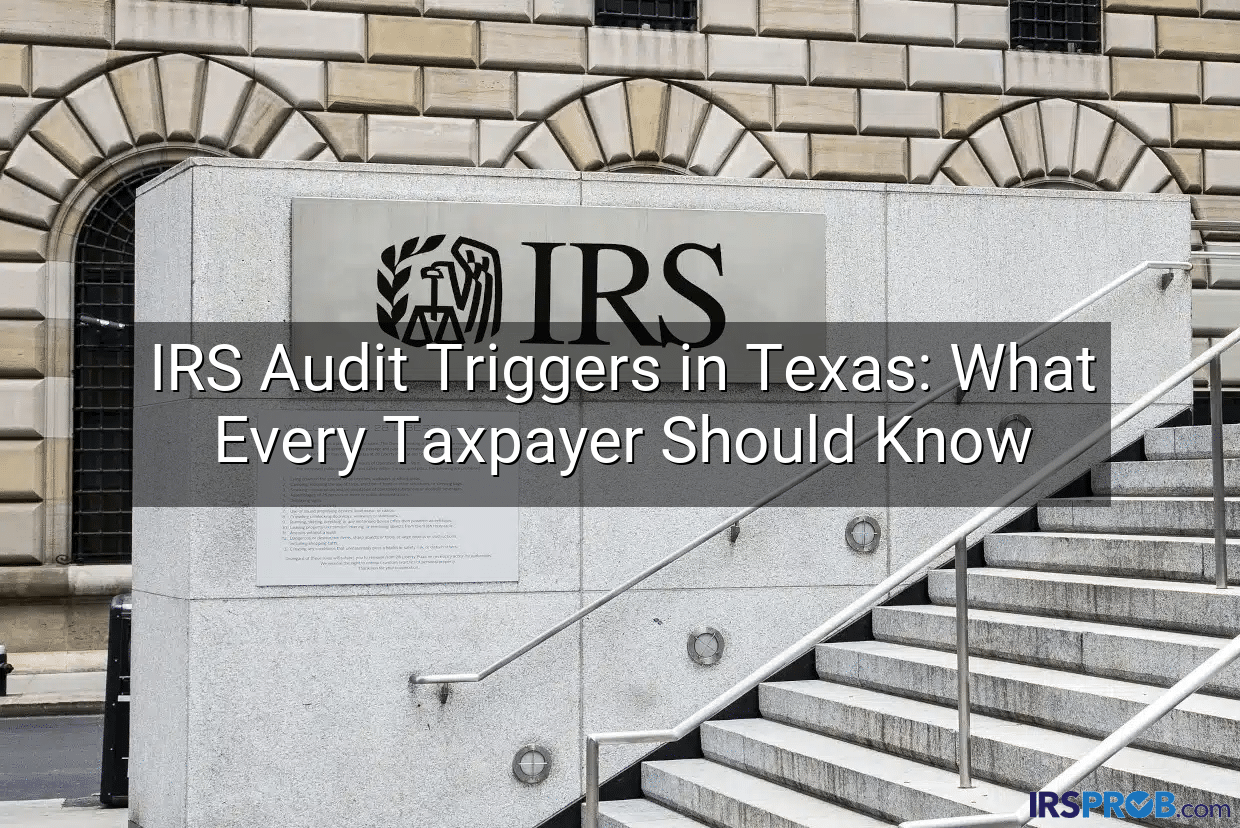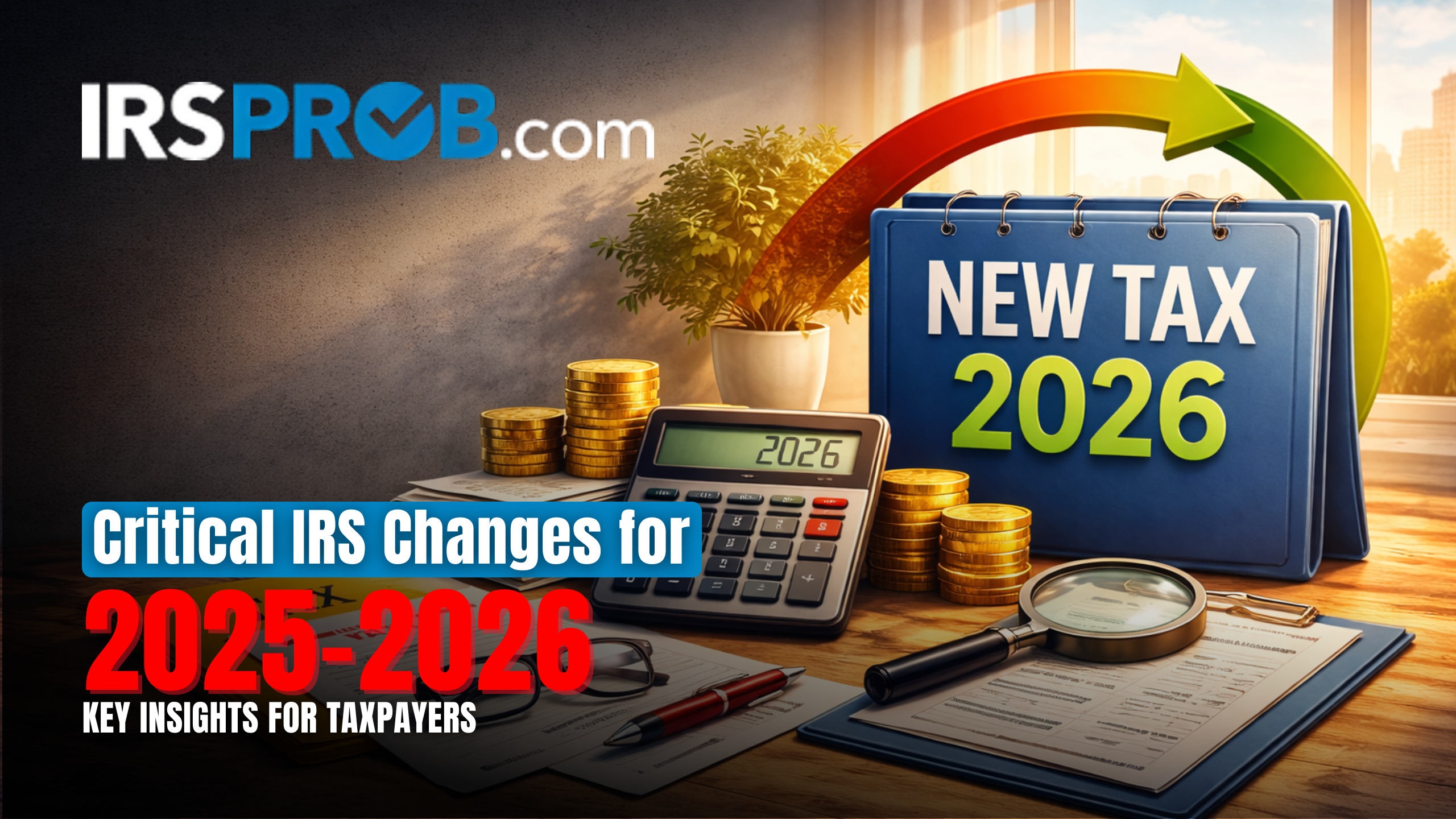IRS Audit Triggers in Texas: What Every Taxpayer Should Know
Taxation in Texas comes with a unique set of challenges that often leave taxpayers wondering what might trigger an IRS audit. Understanding these triggers not only protects you from potential financial pitfalls but also ensures you remain compliant with federal tax regulations. In this comprehensive guide, we explore the various IRS audit triggers specific to Texas, outline mitigation strategies, and delve into how professional assistance from IRS Prob can be a game changer if you ever find yourself under scrutiny. With a focus on practical advice and thorough explanations, this guide serves as your indispensable resource for navigating the often complex world of tax audits in Texas.
Understanding the Basics of IRS Audit Triggers in Texas
Tax audits can seem intimidating, but a fundamental understanding of what triggers an audit is essential for any taxpayer in Texas. At its core, an IRS audit is an examination of your tax return and financial records to ensure accuracy. This process becomes more rigorous when certain high-risk indicators are present in your filing.
Several factors can prompt the IRS to investigate, such as discrepancies in income reporting, unusually high deductions, or significant inconsistencies in expense claims. State-specific nuances in Texas further compound these factors, particularly in the realm of business deductions and property tax exemptions. For example, Texas has unique regulations surrounding sales taxes and franchise taxes that can raise red flags during an audit if not duly reported.
By familiarizing yourself with these triggers, you can implement better record-keeping practices and seek professional guidance to ensure that your filings adhere strictly to the law. Taxpayers in Texas must be particularly mindful of these details, as audit findings can derive from minor mistakes that may otherwise seem insignificant.
Common IRS Audit Triggers in Texas
While the IRS scrutinizes returns nationwide, there are specific triggers that hold extra significance for Texas taxpayers. These red flags are often the result of oversights or deliberate attempts to minimize tax liabilities, and being aware of them can help you avoid costly examinations.
One of the most common triggers is a mismatch in reported income versus what third parties (such as banks and employers) report to the IRS. Texas taxpayers who earn a significant portion of their income in cash, prevalent in industries like hospitality and construction, may inadvertently fall into this trap. Additionally, claiming excessive deductions—especially for business expenses—can signal to the IRS that you might be overstating your expenses or fabricating deductions.
Another frequent audit trigger in Texas is inconsistent reporting on sales tax collections and exemptions. The state’s unique tax structure, with its reliance on sales and franchise taxes instead of an income tax, can create opportunities for reporting errors. Taxpayers, particularly small business owners, must pay careful attention to these details to avoid raising any suspicions.
Furthermore, deductions related to home offices or extensive travel expenses are often closely examined. While these deductions are legitimate when substantiated, they require strict adherence to IRS guidelines. Texas taxpayers in certain professions are more inclined to claim these expenses, which further increases the risk of an audit if proper documentation is not maintained.
Preventive Measures to Avoid IRS Audits in Texas
Preventing an IRS audit begins with meticulous recordkeeping and transparent reporting practices tailored to the tax landscape in Texas. The goal is to present an accurate, detailed picture of your financial transactions and tax obligations throughout the year.
One preventive measure is to maintain organized and comprehensive records for all income and expenses. Leveraging accounting software and digital tools can help ensure that every transaction is properly documented and easily accessible. This practice not only reduces the likelihood of an error slipping through but also builds a solid case in the event of an IRS inquiry.
Regularly reviewing your tax returns for inconsistencies before submission is another critical step. Many taxpayers find that an internal audit—with the help of a tax professional—can identify potential issues well ahead of the official IRS review. Texas taxpayers should pay extra attention to state-specific aspects, such as sales tax accuracy and business-related deductions, which are often scrutinized more heavily.
Furthermore, consider consulting with professionals who specialize in IRS audit triggers specific to Texas. Regular consultations can help you adapt to any changes in tax laws or reporting requirements, ensuring that your submissions remain compliant year after year.
How IRS Prob Empowers Texas Taxpayers
IRS Prob represents a trusted ally for Texas taxpayers who wish to safeguard their financial well-being against unwarranted IRS audits. With a dedicated focus on Texas tax scenarios, IRS Prob combines local expertise with a deep understanding of federal tax laws to offer tailored support and proactive solutions.
At IRS Prob, the team understands that every taxpayer’s situation is unique. This is particularly true in Texas, where factors such as property taxes, sales taxes, and business-specific deductions create a complex filing environment. IRS Prob’s professionals help you navigate these intricacies by providing personalized advice, conducting thorough reviews of your tax returns, and ensuring that your filings meet both federal and state requirements.
Another key service provided by IRS Prob is audit representation. Should you ever be faced with an IRS audit, having a knowledgeable representative who understands Texas’s specific tax landscape can be invaluable. They can assist you in gathering necessary documentation, addressing IRS inquiries, and formulating clear, concise responses that will withstand scrutiny.
By aligning with IRS Prob, taxpayers benefit from a proactive approach to managing audit risks. The service extends beyond reactive measures; it also involves strategic planning to avoid potential pitfalls. With regular consultations, personalized checklists, and up-to-date tax insights, IRS Prob empowers you to maintain compliance effortlessly.
Preparing for a Potential IRS Audit in Texas
Despite your best efforts, an IRS audit can still occur, making preparedness the next best line of defense. Being proactive about audit preparation involves both organizing your financial records and understanding the audit process as it pertains to Texas. This approach not only minimizes stress, but it also strengthens your position should the IRS decide to take a closer look at your filings.
Begin by ensuring that every section of your tax return is well-documented. This means retaining invoices, receipts, bank statements, and all relevant financial documents for at least seven years, as advised by the IRS. For Texas taxpayers, extra caution is warranted when it comes to state-specific deductions such as home office or business expenses. Organize these documents in a systematic manner, preferably in digital format, to reduce the risk of loss or misplacement.
Next, familiarize yourself with the audit process so that you know what to expect. IRS audits can range from simple correspondence inquiries to more intensive field audits. Regardless of the type, being cooperative, prompt, and transparent during the process is key. Having an audit checklist can be immensely helpful, detailing the essential documents and responses required for a smooth audit experience.
It is also advisable to conduct periodic internal reviews of your financial records, ideally with the help of a tax professional. This preemptive measure can help identify any overlooked discrepancies and allow you to make corrections before the IRS finds them. In addition, regular audits of your own records can help you gain peace of mind, knowing that you are prepared should an audit ever occur.
Debunking Common Myths about IRS Audits in Texas
A host of myths surround the IRS audit process, often creating undue fear and confusion among Texas taxpayers. Dispelling these misconceptions is crucial, as it allows you to focus on practical preparation and informed decision-making rather than being paralyzed by misinformation.
One common myth is that anyone who files an amended return is automatically flagged for an audit. In reality, while amended returns might attract additional attention, they also represent a taxpayer’s effort to correct genuine mistakes rather than conceal them. Another pervasive misconception is that only high-income earners face audits. The truth is that audits are designed to uncover discrepancies, regardless of the amount of income reported.
Additionally, many believe that having a tax preparer absolves you of the responsibility for your tax filings. However, while professional help certainly minimizes the risk of errors and oversights, the ultimate responsibility for ensuring tax compliance remains with you. Misunderstandings like these can lead to a false sense of security, leaving taxpayers unprepared if issues arise.
By confronting and debunking these myths, Texas taxpayers can adopt a more rational, proactive approach to managing their finances and complying with IRS requirements. A clear understanding of the actual risks and required precautions will go a long way toward preventing future complications.
Navigating the Regulatory Environment and Recent Changes
The regulatory environment surrounding IRS audits in Texas is continually evolving. Changes in tax law, state-specific reforms, and adjustments in IRS policies can all influence the likelihood and nature of an audit. Keeping abreast of these changes is essential for all taxpayers, as it ensures that your tax practices remain compliant with the current legal framework.
Recent shifts in federal policy have introduced stricter measures for reporting large transactions and enhanced scrutiny of certain deductions. As Texas taxpayers, you must be aware of how these reforms interact with the state’s tax requirements. For instance, modifications in franchise tax rules have prompted a more detailed review of business financials. Meanwhile, updates to home office and travel expense rules require greater documentation and precision when filing your returns.
Staying informed may require regular consultations with tax professionals, subscribing to reputable tax law updates, or participating in local seminars tailored to Texas tax issues. Understanding not only the changes but also the rationale behind them can empower you to adapt your recordkeeping and financial practices accordingly.
Enhanced communication with professionals like those at IRS Prob can also be instrumental. They often provide timely updates and practical insights into how regulatory changes might impact your specific scenario. With proactive measures, the shifting regulatory landscape becomes less of an obstacle and more of a driving force for better tax compliance strategies.
Pro Tips from IRS Prob
Pro Tip #1: Maintain a Comprehensive Recordkeeping System
One of the most effective ways to avoid IRS audit triggers in Texas is to invest in a well-organized recordkeeping system. Whether you are an individual or a business, ensure that every transaction is documented with appropriate receipts, invoices, and bank statements. Digital recordkeeping can simplify retrieving documents during an audit, enhancing your ability to respond swiftly and accurately to any IRS inquiries.
Pro Tip #2: Periodically Consult with Tax Professionals
Proactive consultation with tax professionals can be a linchpin in avoiding IRS audit pitfalls. Schedule regular reviews of your tax filings and financial records to catch any discrepancies before they escalate. Tax experts at IRS Prob specialize in Texas tax regulations and can offer tailored advice, ensuring that your tax practices remain robust and adhere strictly to state and federal requirements.
Pro Tip #3: Stay Informed About Regulatory Changes
The tax landscape is constantly evolving, making it crucial to stay up-to-date with both federal and Texas-specific tax law changes. Subscribe to reputable tax updates and attend local seminars to understand the latest regulatory modifications. Adopting a proactive approach to learning not only prevents inadvertent misreporting but also positions you to leverage any new deductions or credits available under updated laws.
This detailed guide is designed to equip Texas taxpayers with the knowledge necessary to navigate the complex world of IRS audit triggers with confidence. By adopting best practices in recordkeeping, leveraging professional advising services like those offered by IRS Prob, and staying current with regulatory changes, you can significantly reduce your audit risk. We hope that the insights provided in this comprehensive resource will empower you to manage your taxes more effectively, and should you need further personalized advice, remember that professional help is just a consultation away.
From identifying potential pitfalls to debunking common myths, this guide encourages a proactive stance toward tax compliance. Whether you’re managing a burgeoning business or filing personal tax returns, adopting these strategies not only minimizes the risk of an IRS audit but also contributes to a clearer, more accurate financial record. Remember, being audit-ready is a continuous process, and every thoughtful action contributes to a secure financial future. Your diligent efforts today will pay off in stress-free tax seasons tomorrow.
For further reading, consider exploring additional resources and consultation sessions with tax professionals well-versed in Texas regulatory issues. Empower yourself with continuous knowledge, and stay proactive in managing your finances, so that you can focus on growing your business or personal wealth without the looming worry of an IRS audit.







